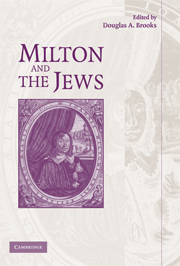Book contents
- Frontmatter
- Contents
- Acknowledgments
- Contributors
- 1 Introduction: Milton and the Jews: “A Project never so seasonable, and necessary, as now!”
- 2 England, Israel, and the Jews in Milton's Prose, 1649–1660
- 3 Milton's Peculiar Nation
- 4 Making Use of the Jews: Milton and Philo-Semitism
- 5 Milton and Solomonic Education
- 6 T. S. Eliot, Anti-Semitism, and the Milton Controversy
- 7 A Metaphorical Jew: The Carnal, the Literal, and the Miltonic
- 8 “The people of Asia and with them the Jews”: Israel, Asia, and England in Milton's Writings
- 9 Returning to Egypt: “The Jew,” “the Turk,” and the English Republic
- Select Bibliography
- Index
6 - T. S. Eliot, Anti-Semitism, and the Milton Controversy
Published online by Cambridge University Press: 02 July 2009
- Frontmatter
- Contents
- Acknowledgments
- Contributors
- 1 Introduction: Milton and the Jews: “A Project never so seasonable, and necessary, as now!”
- 2 England, Israel, and the Jews in Milton's Prose, 1649–1660
- 3 Milton's Peculiar Nation
- 4 Making Use of the Jews: Milton and Philo-Semitism
- 5 Milton and Solomonic Education
- 6 T. S. Eliot, Anti-Semitism, and the Milton Controversy
- 7 A Metaphorical Jew: The Carnal, the Literal, and the Miltonic
- 8 “The people of Asia and with them the Jews”: Israel, Asia, and England in Milton's Writings
- 9 Returning to Egypt: “The Jew,” “the Turk,” and the English Republic
- Select Bibliography
- Index
Summary
MILTON'S PARADISE REGAINED AND SEMITIC-CENTRISM
It is an accepted convention of Milton criticism to speak of Paradise Regained as a sequence of temptations. The poem's penultimate temptation, a dramatic event in the narrative that Miltonists have come to refer to as “the temptation of Athens,” features lines that characterize and evaluate a body of cultural knowledge that has most often been labeled as the classical tradition. The lines in question occur when Satan tempts the Son with an offer of knowledge. Satan asks Jesus to consider the fact that:
All knowledge is not couched in Moses’ law,
The Pentateuch or what the prophets wrote,
The Gentiles also know, and write, and teach
To admiration, led by nature's light;
And with the Gentiles much thou must converse,
Ruling them by persuasion as thou mean'st,
Without their learning how wilt thou with them,
Or they with thee hold conversation meet?
In my reading of the poem, Satan is not offering the Son the sum of all knowledge. The lure Satan extends here is not even all classical knowledge, but knowledge of a much more limited sort, that is, Gentile “learning” of the kind that will be valuable in helping the Son in his effort to rule not just over Jews but all humanity. Nor do I see Jesus’ response as constituting a rejection of this knowledge.
- Type
- Chapter
- Information
- Milton and the Jews , pp. 105 - 127Publisher: Cambridge University PressPrint publication year: 2008



